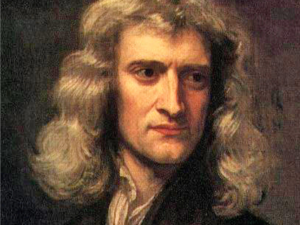
Born on Christmas Day in 1642, the world was gifted Isaac Newton (1642 – 1727) who went on to become the greatest scientist of his era and one of the most influential persons of all time. He made a number of revolutionary discoveries involving mass, inertia, motion, gravitation, and optics. In the process of achieving some of those discoveries, he invented an entire new field of mathematics called calculus. Indeed, to see further than Newton one would have to be standing on the shoulders of a giant.
Newton grew up in England in an nurturing family environment as his father died before his birth and his mother left him in the care of his grandmother shortly after. This early childhood experience surly affected his emotional state in adulthood. Newton attended Cambridge University in 1661 at the time that the Scientific Revolution was underway. In 1665 an outbreak of plague forced the university to close forcing Newton to return home. During the next 18 months Newton produced some of his scientific best works.
As prolific as Newton’s lifetime scientific achievements were, he squandered much of his time during the 1670s studying alchemy, the occult, and writing religious tracts. Many of us think of Newton as the first of the modern scientists but as John Maynard Keynes perceptively noted he was more like the last of the magicians. He became and increasingly isolated individual with an abrasive personality. It was only with the encouragement and financial backing of his friend Edmond Halley that he published his most famous work Principia in 1687 which laid out his laws of motion and universal gravitation.
Newton’s scientific achievements awarded him an enormous amount of fame, influence, status, and wealth. He was made a Fellow of Trinity College in 1667, elected Lucasian Professor of Mathematics in 1669, elected a Fellow of the Royal Society in 1672, elected a Member of Parliment in 1689, became Warden of the Mint in 1696, Master of the Mint in 1698, elected President of the Royal Society in 1703, and Knighted by Queen Anne in 1705.